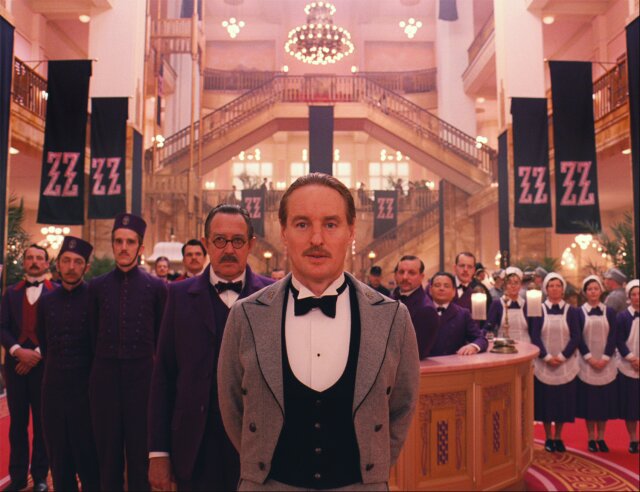Upon first watch of The Grand Budapest Hotel, I immediately noticed the interesting way Anderson incorporates the rise of Nazi Germany in the film without directly portraying any actual fascist iconography. Of course, he creates his interpretation of the SS (Schutzstaffel) through the ZZ or Zig-Zags. We see the Nazi-like red and black emblem of the ZZ several times throughout the film. Still, it is particularly noticeable on flags and officers’ uniforms as the severity of the political situation in Zubrowka worsens. I wanted to know the thought process behind this decision, so I found a 2014 interview with Vulture in which Anderson extrapolated his reasoning. In this piece, Anderson explains that he wanted the story to focus more on the inheritance of the hotel itself rather than its context of a region’s descent into dictatorship. By setting The Grand Budapest Hotel in the fictional nation of Zubrowka, Anderson seeks to blend together “a pastiche of different countries,” creating a dreamlike “impressionist version of the war.” In the same interview, Anderson is askedabout the ZZ and why they are portrayed as dangerous, but they also “come across as adorable.” His response is that, like the majority of the film, the Zig-Zags are a mixture of historical reality and his personal imagination, adding that “the Z is maybe because of Zubrowka, the country.”

Initially, I had assumed that Anderson did not want to show the ZZ as ruthless and cruel as the SS historically were because that would be giving power and validity to such figures. However, after our class discussion about how ideologies are inherently political, maybe this was an intentional choice with layered meanings. Perhaps the absurdity of the ZZ in The Grand Budapest Hotel desensitizes the audience to the brutality of fascism. This aestheticization of evil might inadvertently normalize authoritarian symbols, making them seem less threatening or harmful. In this way, The Grand Budapest Hotel could subtly suggest that the twisted descent into Nazism occurred due to the obstruction of its dangers behind a detached façade and powerful visuals.
Link to the article: https://www.vulture.com/2014/03/wes-anderson-on-grand-budapest-and-his-socks.html